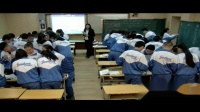视频简介:

视频标签:Olympic Game
所属栏目:高中英语优质课视频
视频课题:人教版高中英语必修二Unit 2 The Olympic Games Book 2 unit 2 Reading内蒙
本视频配套资料的教学设计、课件 /课堂实录及教案下载可联本站系客服
Book II Unit 2 The Olympic Games
Reading
【学习目标】
1. 通过skimming(略读)和scanning(找读)阅读策略,学生能够总结出文章主旨大意及了解奥运会的有关知识。
2. 通过detailed reading(精读),学生能够了解古代和现代奥运会的异同及现代奥运会的一些基本情况。
3. 通过对古代和现代奥运会的对比,学生能够感受到时代在发展变化,但奋勇拼搏的奥运精神并未改变。
【重点和难点】1.理解古代奥运会与现代奥运会的异同 。
2.学习奋勇拼搏的奥运精神。
The origin of the Olympics
There are many different stories about the beginning of the Olympics. One myth says that the guardians of the infant god Zeus (
宙斯)held the first footrace, or that Zeus himself started the Games to celebrate his victory over his father Cronus for control of the world. Another tradition states that after the Greek hero Pelops won a chariot race against King Oenomaus to marry Oenomaus's daughter Hippodamia, he established the Games. Athletic games also were an important part of many religious festivals from early on in ancient Greek culture. In the Iliad, the famous warrior Achilles holds games as part of the funeral services for his best friend Patroclus. The events in them include a chariot race, a footrace, a discus match, boxing and wrestling. The footrace was the sole event for the first 13 Olympiads. Over time, the Greeks added longer footraces, and separate events. The pentathlon and wrestling events were the first new sports to be added, in the 18
th Olympiad.
【Vocabulary
】:
Cronus:克罗诺斯,希腊神话中的提坦巨人之一,在被他的儿子宙斯废黜之前一直统治着宇宙。 chariot: 战车
Olympiad: the Olympic Games held every four years, the cycle of four years四年周期
【课前预习案】
使用说明&学习建议
1.在预习时把课文通读两遍,第一遍通读课文完成限时阅读表层理解题,第二遍通读全文并勾画文章中的重难点。
2.扎实掌握词汇、句型与语法,提升自己的理解力、记忆力。
3.自主学习,合作探究。学会分析与总结的方法,并能学以致用。
4.激情投入,疯狂记忆,体验学习的快乐.
|
学法指导:略读(Skimming)指快速浏览课文,从整体上把握文章的主旨大意,找到文章或段落的主题句。理解文章主要思想。
|
|
Task 1. Skimming
What does the passage tell us?(在正确选项前打对钩)


the ancient Olympic Games the modern Olympic Games

good & bad effects of the Olympic Games


the similarities between them the differences between them
|
学法指导:找读(Scanning)指以问题为线索,带着问题去寻找某一特定信息的阅读方法。快速找到定位词(即关键词key words)到原文去查找是很关键的。
|
|
Task 2. Scanning
1.What
questions does Pausanias ask?
________________________________________________________________________________
________________________________________________________________________________
________________________________________________________________________________
________________________________________________________________________________ ________________________________________________________________________________
2.What are the
similarities about the ancient and modern Olympics?
1)Both are held not for money but for ______.
2)The Games are held every ______years.
3)____are allowed to take part in both in ancient and modern Olympics.
4)The mottos are the same. They are: ________________________________________.
5)Some events are the same, such as ____________________________________________.
3.What are the
differences about the ancient and modern Olympics?
 |
Ancient Olympic Games |
Modern Olympic Games |
|
1.How many kinds? |
____________________ |
________________________ |
|
2.More/Less events? |
____________________ |
________________________ |
|
3.Men / Women athletes? |
____________________ |
________________________ |
|
4.Host city |
____________________ |
________________________ |
|
5.Prize |
____________________ |
________________________ |
【合作探究案】
|
学法指导:精读(Detailed Reading)是指深入细致地研读。对重要的内容,要认真读反复读,对重要的语句要做到透彻理解。
|
|
Detailed Reading
探究点一:Answer these questions.
1)When Mr. Pausanias hears that women are allowed to join in,
how about his feeling ?( )
A. sad B.surprised C.happy
2)
What’s Li Yan’s attitude towards the Modern Olympics? ( )
A. disappointed B. uninterested C. proud
3)
Where can you probably find this kind of article? ( )
A. novel B. newspaper C. science textbook
4)
How does the writer introduce the Olympics? ( )
A. by comparing B. by giving examples C. by explaining
5)
Which word can best replace the word “basis”(L14)? ( )
A. theory B. practice C. discipline
探究点二 :What can we learn from the Olympic Games?(As students)
____________________________________________________________________________________________________________________________________________________________________
探究点三 :Summary of the interview
The Olympic Games are the 1.
________ (big) sports event in the world. There are two kinds of Olympic Games. One is the Summer Olympic Games, and the 2.
_______ is the Winter Olympic Games. Both of them 3.
_________ (hold) every four years. All countries can take part if their athletes reach the standard to be admitted 4.
______the games.
Women are not only allowed to join in 5.
________play a very important role. A special village is built for the 6.
__________ (compete) to live in, including a main reception building, several stadiums for competitions, a gymnasium and seats for audience 7.
_________watch the games. It is 8.
______ great honour to host the Olympic Games. In addition, for many countries there's just as much competition to host the Olympic Games as to win Olympic medals. Nowadays the olive wreath 9.
___________ (replace) by medals. But it's still all about being able to run faster, jump 10.
________ (high) and throw further.
【巩固提高案】
Role play
Imagine Mr. Pausanias is going to watch Rio Olympic Games, and you are interviewing him.
What questions will you ask and what will Mr. Pausanias answer them?
Make a dialogue with your partner.
Some questions for the reporter:
1)What do you think of Rio Olympic Games?
2)What's your opinion of…?
3)Which sport do you like? Why?
Useful expressions for Mr. Pausanias :
1)I think/ don't think that…
2)In my opinion…
3)My favorite sport is...Because...
教学设计
课题
课型 课时安排 授课时间 授课教师 授课班级 Book II Unit2
The Olympic Games
新授课
1课时
2017年3月7日
(周二)
高一四班
课标要求
1..能根据具体的阅读目的使用不同的阅读策略。
(1)略读(Skimming) (2)找读(Scanning) (3)理解大意 (4)推理判断; 2.培养用英语获取和处理信息的能力。
教材分析
本单元的中心话题是“奥运会”。通过本单元的教学,使学生了解奥运会的起源、宗旨、比赛项目以及古现代奥运会的异同。学会用英语表达自己的兴趣爱好以及如何向别人推荐某一种爱好,同时培养学生对体育运动的爱好。Reading部分作者通过一个虚拟的采访向读者介绍了古代奥运会与现代奥运会的异同.
学情分析
2008年第29届奥运会在北京成功举行。从奥运会的申办到举行,我国各大媒体都广泛的进行了宣传,所以学生对奥运知识和奥运项目都有一定的了解。对以“奥运会”为主题的课文学习都很感兴趣。高一学生具备基本的听说读写的能力。
设计理念
以新课程、新理念为指导,充分发挥学生的主体作用和教师的主导作用,引导学生通过三案并举、合作讨论,熟悉文本并提高阅读能力。 学习目标
1.通过skimming(略读)和scanning(找读)阅读策略,学生能够总结出文章主旨大意及了解奥运会的有关知识。 2.通过detailed reading(精读),学生能够了解古代和现代奥运会的异同及现代奥运会的一些基本情况。
3.通过对古代和现代奥运会的对比,学生能够感受到时代在发展变化,但奋勇拼搏的奥运精神并未改变。 重点难点
1.理解古代奥运会与现代奥运会的异同。 2.学习奋勇拼搏的奥运精神。
教法学法
教学方法:师生互动法,讲授法
学习方法:自主学习,合作探究,归纳总结
教学准备
学生: 完成课前预习案,积极参与课上活动。
教师: 批阅课前预习案,培训学生,查阅资料并制作多媒体课件。
授课流程
教 学 过 程
教学环节 教师活动 学生活动 设计意图
课前核对导学案答案
候课
学生核对导学案答案
培养学生自查自纠的能力 导入新课
1)图片和学生表演 2)小组竞赛
1)学生观看表演并思考
2)积极参与小组竞赛
吸引学生眼球,通过直接有趣的采访引出本节课话题。
解读目标 解读学习目标
学生明确本节课的学习目标
指导学生有目的地学习本节课内容
预习案反馈 Skimming Scanning 教师反馈课前导学案,多媒体上展示大家共同存在的问题,并给予学法指导
学生倾听、认真做好笔记并核实答案。 预习案的目的是培养学生快速阅读和找读的能力并理解文章。反馈的目的是解决学生预习案中共同存在的问题,为课上阅读做好铺垫。
合作探究案
1.分配学生要展示的任务 2.教师在学生探究过程中给予指导
3.教师在学生展示过程中应及时点拨
1.自主完成合作探究案 2.讨论 3.展示 4.质疑补充
1.培养学生自主学习能力 2.在阅读练习中灵活使用阅读技巧并深入理解文本。 3. 培养学生的合作意识
巩固提高案
老师布置任务 角色扮演
学生限时完成巩固案 1.更深入的了解采访这种式
2.通过对话让学生积极动地参与本单元中心话题的思考与讨论
3.提升学生口语表达能力
课堂总结
1.总结本节课 2.学习奋勇拼搏的奥运精神 思考什么是奥运精神 归纳总结本节课,回扣学习目标并进行情感升华。
作业
布置作业
教学反思
1.学习目标制定清晰,知识目标,能力目标,情感目标层层递进,评价任务设计优先于学习活动的逆向教学设计思维,体现了教学评一致性;
2.教学活动是基于学生的情况而设计,以学生为主体,整个教学过程流畅,环环相扣,层层推进,层次分明,并最终回扣主题;
3.课堂气氛活跃,学生在教师的指导下有序的积极的完成任务,学习目标基本完成达到了预期的效果;
4.缺点和不足:学生课堂上出现的有些口误未及时纠正,学生点评时,也应尽量用英语.
视频来源:优质课网 www.youzhik.com
| -----更多视频请在本页面顶部搜索栏输入“Olympic Game”其中的单个词或词组,搜索以字数为3-6之间的关键词为宜,切记!注意不要输入“科目或年级等文字”。本视频标题为“人教版高中英语必修二Unit 2 The Olympic Games Book 2 unit 2 Reading内蒙”,所属分类为“高中英语优质课视频”,如果喜欢或者认为本视频“人教版高中英语必修二Unit 2 The Olympic Games Book 2 unit 2 Reading内蒙”很给力,您可以一键点击视频下方的百度分享按钮,以分享给更多的人观看。优质课网 的成长和发展,离不开您的支持,感谢您的关注和支持!有问题请【点此联系客服QQ:983228566】 ----- |